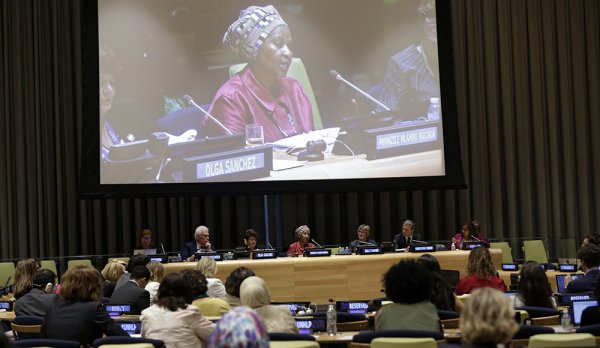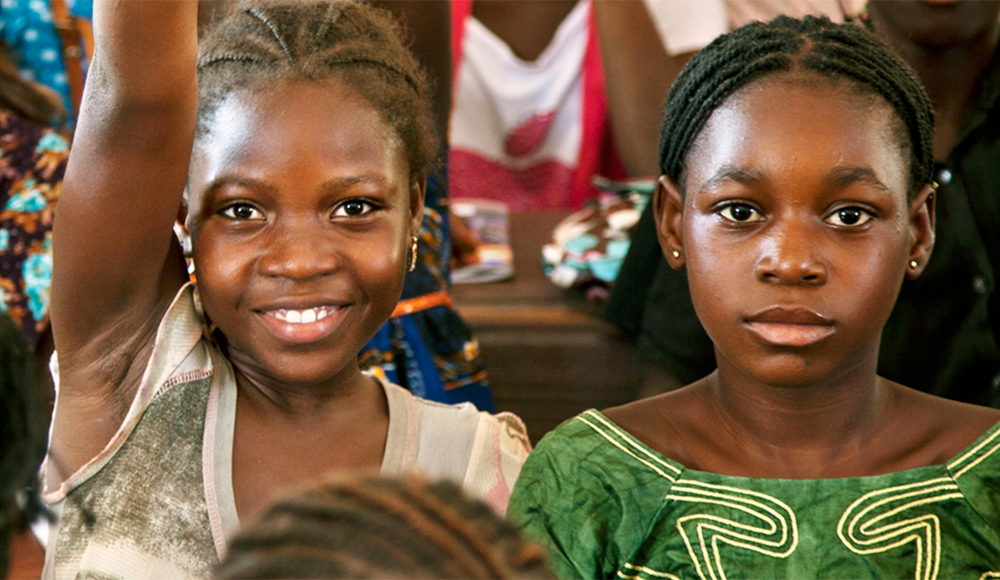Two years ago, 193 countries adopted a roadmap for the next fifteen years at a United Nations Summit. Like any good roadmap, it outlines clear destinations. Gender equality is one of the destinations, and UN Women is a catalyst to help get us there.
This roadmap, or the Sustainable Development Goals (SDGs), was much anticipated. Unlike the Millennium Development Goals (MDGs) which preceded them, there is one standalone gender goal. Goal 5 (SDG #5) aims to achieve gender equality and empower all women and girls. It makes a strong statement that without gender equality, development is not possible.

The UN Sustainable Development Goals.
The SDGs are not designated as pathways for developing countries alone, but rather pathways to progress for everybody, in every country around the world.
What’s more, woven into the 17 SDGs, whether focussed on improving water and sanitation or clean and affordable energy, are targets that consider impacts on and opportunities for women and girls.
SDG #5 makes a strong statement that without gender equality, development is not possible.
Why does this matter? Fundamentally, we will not achieve peace, prosperity or a healthy planet if we leave 50% of the population behind.
For example consider SDG #1, ending poverty: we can’t end poverty unless we eliminate gender-based discrimination, and give women equal opportunities to decent work.
Gender inequality makes and keeps women poor. Today, 90% of countries have laws in place restricting women’s economic opportunities. Just 20% of landowners are women. More than 1.3 billion women don’t have access to an account at a formal financial institution.
Fundamentally, we will not achieve peace, prosperity or a healthy planet if we leave 50% of the population behind.
To tackle this, UN Women convenes civil society and grassroots activists, and advises the highest levels of government to facilitate changes to legislation. We enable women to inherit and own property and eliminate restrictions on participating in certain jobs, working at night and improving parental leave.
We work with local government and banks to make it easier to open a bank account, and brings bankers to workplaces directly, such as fruit and vegetable markets. This makes depositing one’s daily earnings more accessible and secure. These initiatives unlock access to savings, credit and boost financial literacy, important pathways to ending poverty.

The High-level Political Forum on Sustainable Development (HLPF) took place at the UN Headquarters in New York from 10 – 19 July 2017. Photo: Flickr/UN Women/Ryan Brown.
We recognise the important role that developing and implementing model legislation can have on women and girls, to advance the SDGs. For example, many countries have laws with clauses protecting perpetrators of rape from prosecution when they are married to, or subsequently marry, the victim.
UN Women has been instrumental in convening women’s activists to mobilise, and providing technical support leading to the repeal of such laws, from Morocco to Jordan.
Knowledge is power
We have to know where we’re coming from before we can get a sense of how far we have to go and pathways to get us there.
To monitor progress, we need good data – disaggregated by sex – to understand impacts on and opportunities for women and girls, linked to every SDG. Making Every Woman and Girl Count is a UN Women-led, Australian Government-supported public/private partnership to generate, prioritise and use gender data.

UN Women’s Yannick Glemarec discusses Men’s Role in Achieving Gender Equality at a HeForShe event.
The success of the SDGs hinges upon us as individuals understanding them, embracing them, sharing and reporting on them, and, making change in our own lives, communities and nations.
The Lazy Person’s Guide to Saving the World, published by the UN, outlines a list of simple actions we can all take in our home, outside in the world, or, quite literally, from the comfort of our sofa.
And the ambitious roadmap, if diligently travelled, has the potential to radically advance peace, prosperity and protect the planet. While there is work for governments to do, equally, through our own actions we can advance progress too.
A gender equal world offers equal opportunities to all people, to lead, learn, earn, and live lives free of violence. The SDGs are a roadmap that can help get us there. But we can’t go it alone.
A gender equal world offers equal opportunities to all people.
We cannot wait another minute before taking action, because the future is in all our hands.
The SDGs & Gender Equality: From Global to the Pacific event is made possible thanks to support from DFAT. Bookings are essential for this free event.




